If you browsed PharmaPassport in November, you probably noticed a lot of buzz around agrimony. This isn’t just another herb – it’s become the talk of the supplement community for good reasons. Let’s break down what made agrimony the star of the month and why you might want to give it a closer look.
Agrimony is a leafy plant that grows in Europe and parts of Asia. Historically, herbalists used it for soothing coughs and skin irritations. Today, researchers are digging into its chemistry and finding compounds that can support immunity, reduce inflammation, and even help balance blood sugar. The plant’s leaves and roots are where most of the active ingredients live, so supplements usually contain extracts from both.
First up, immune support. Agrimony is rich in flavonoids, which act like tiny shields against oxidative stress. People who take it during cold season report fewer sick days, and a small study in Germany showed a modest boost in white‑blood‑cell activity after four weeks of use.
Second, inflammation relief. The plant’s tannins have an anti‑inflammatory effect that can calm joint discomfort. A fitness blogger shared how a daily agrimony capsule helped her recover faster from intense workouts.
Third, digestive health. Agrimony has mild astringent properties that can soothe the gut lining, making it useful for occasional stomach upset. It’s not a replacement for medical treatment, but many users find it helpful as part of a balanced diet.
Finally, skin benefits. Because of its antioxidant load, topical creams with agrimony extract are marketed for reducing redness and promoting clearer skin. If you’ve tried other herbal creams, this one is worth testing out.
So, how do you add agrimony to your routine safely? Start with a low dose—typically 300‑500 mg of standardized extract per day—and see how your body reacts. Most reputable brands list the exact concentration of active compounds, which makes it easier to compare products. If you’re pregnant, nursing, or taking medication, chat with a healthcare professional first.
Where can you find reliable agrimony supplements? Look for third‑party testing labels like USP or NSF. These certifications mean the product was checked for purity and accurate dosing. Avoid cheap powders that don’t disclose their source; they often contain fillers that dilute the benefits.
Beyond supplements, some people brew agrimony tea from dried leaves. It has a mild, slightly bitter taste—perfect with honey if you need a touch of sweetness. Steep one teaspoon in hot water for five minutes and sip it after meals to aid digestion.
Overall, November’s focus on agronomy reflected a growing interest in natural solutions that back up traditional uses with modern research. Whether you’re looking to boost immunity, calm inflammation, or just try something new, agrimony offers a simple option worth exploring.

